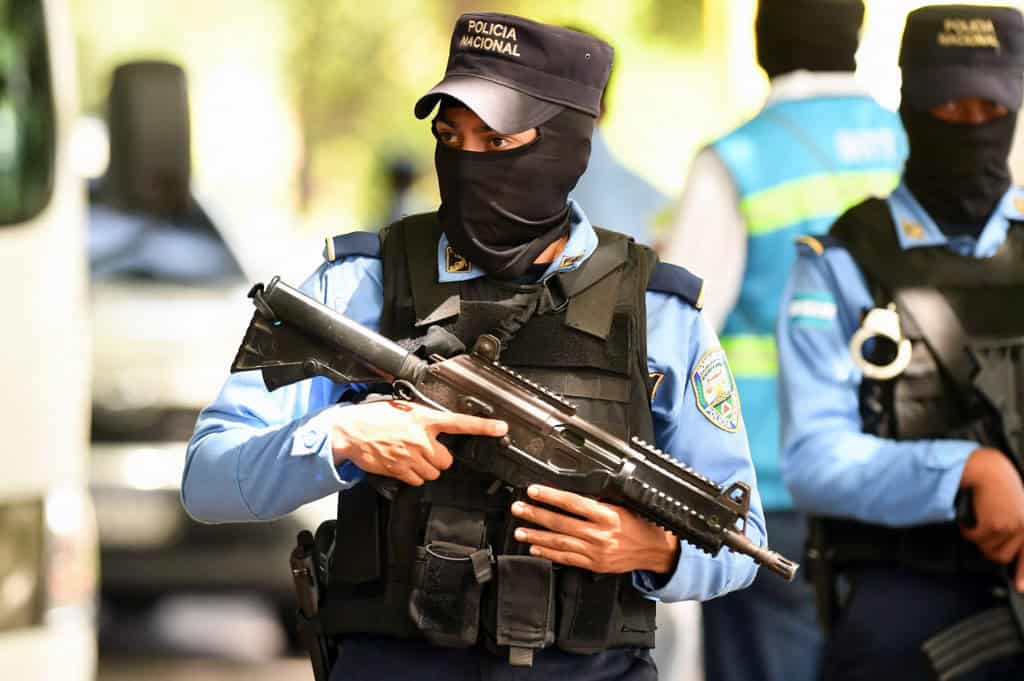Honduras is not at war. But as in countries in conflict, thousands of families have abandoned their homes to escape violence. Gang members and drug traffickers force them to leave to use their homes as surveillance points, to sell drugs retail, or as “crazy houses,” places of death and horror where they commit the most perverse crimes.
Gangs and narcos maintain “a mini-government” in the territories they control, according to the office of the National Commissioner for Human Rights (Ombudsman), which has a unit dedicated to “internal forced displacement.”
In 2023, this office received 1,761 complaints of forced displacement, but a study by the United Nations High Commissioner for Refugees (UNHCR) detailed that between 2004 and 2018 there were 247,000 cases in Honduras. “UNHCR is here in Honduras working on prevention and response (…) to forced displacement,” UNHCR representative Kathryn Lo says. She explains that UNHCR assists victims and advises the government in defining policies to address the problem.
People flee due to “threats, extortion, the murder of a family member, the dispossession of goods and properties, and recruitment of children,” explains Elsy Reyes, head of Human Mobility at the Commissioner’s office. “They are even given 24-hour terms to leave,” Reyes says. It’s not easy to talk to displaced people, as they are terrified of appearing in the media.
Empty Houses
Gang members and narcos have turned Honduras into one of the most violent countries in the world without war. Also, into a territory with thousands of abandoned houses. The homicide rate reached 38 per 100,000 inhabitants in 2023, six times higher than the world average. However, the figure has been declining, as it was 79 in 2013. The Property Registry is counting “abandoned homes,” which up to 2018 were 50,000, says Reyes.
A few weeks ago, gang members forced a family to leave a house they were renting in Mirador de Oriente, a working-class neighborhood in Tegucigalpa. The vacated house was rented again to a young couple, who moved in with the help of three friends on June 23. However, upon arriving at the house, all five were kidnapped.
Their bodies were found a week later in a nearby rugged mountain. Six suspects have been detained for this crime, attributed to the feared Barrio 18 gang.
Fleeing the Country
In addition to internally displaced people, thousands of Hondurans have left the country to escape violence. “It’s a gradual increase every year,” says Lo. According to UNHCR figures, in 2014 there were 14,305 Hondurans “refugees or asylum seekers” in other countries. In 2023, the figure jumped to 301,236.
“The majority are in the United States and Mexico,” Lo specifies. Internally displaced people and those seeking refuge abroad total “more than half a million, within a population of ten million” people, that is, “5% of the Honduran population,” Lo highlights.
“It’s not easy to solve this,” she adds. However, Lo highlights as a positive step the approval in 2023 of the “Law on prevention, protection and care of internally displaced persons,” which stipulates “providing food” and “payment for housing for up to six months” to victims.
The State Also
To combat gangs, authorities imposed a state of exception in December 2022 that allows arrests without a court order. Under this rule, the leftist government of Xiomara Castro has deployed thousands of police and military throughout the country.
Security Minister Gustavo Sánchez states that arrests of fugitives increased by 85%, 12,000 weapons have been seized, and 4,500 members of gangs or drug cartels have been detained. But police raids also stimulate forced displacements, according to the Ombudsman’s office.
“The state of exception has had a strong impact on forced displacement. We have identified cases where, as a result of constant raids by the National Police, people are forced to abandon their homes,” says Reyes.
Therefore, “displacement is not only caused by individuals or criminal structures, it is also caused by the State itself, even by justice operators,” she adds.






